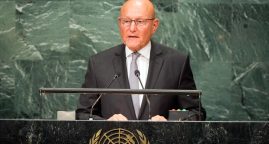Donors slow to honor Syria refugee pledge: UNHCR official
In February, the richest world powers pledged more than $11 billion to help frontline states in the Middle East cope with the Syrian refugee crisis.
But four months later, less than a quarter of the headline sum has been turned over and five million people are still at risk in an unstable region.
Countries like Lebanon, Jordan and Turkey are struggling with the influx — and the displaced populations face the threat of radicalization in their ranks.
“So I think there’s a collective failure that will have to addressed,” Amin Awad, the United Nations High Commissioner for Refugees director for the Middle East and North Africa, said in an interview.
Awad said that since February, when foreign ministers from around the world gathered at a London donor conference, only $2.5 billion have been disbursed.
Frontline states
This is in the form of loans, grants for specific uses like student bursaries and straight-forward humanitarian aid, but it has not proved enough.
“I think the frontline states are disappointed and they feel they’re left alone,” he said in Washington, where he is meeting US officials and experts.
Quite simply, the world is facing an unprecedented refugee crisis with at least a dozen protracted wars and crises ongoing at the same time.
There are more refugees worldwide than ever before — around 60 million — and more than a third of these are from the broader Middle East region alone.
“If you look at the Middle East population compared the world’s seven billion people, it is about five to seven percent,” he said.
“And yet they’ve produced 35 to 40 percent of these cases,” he added. “It’s a region that has seen a lot.”
Iraq has been evolving through periods of instability and of outright civil war since the US-led invasion of 2003 ousted long-standing dictator Saddam Hussein.
Syria was plunged into chaos five years ago when Bashar al-Assad moved to crush anti-government protests, and Yemen and Libya are in the grip of conflict.
Last year, Europe faced what Awad called a “great march” of up to a million refugees who crossed the Aegean on rafts and walked north through the Balkans.
As that route has become closed off, refugees are turning again to boats to take them from the North Africa coast to Italy — often with tragic consequences.
Ban on Muslims
The purpose of conferences like the one in London was to internationalize the issue, as frontline Middle East states were facing the worst burden.
But — despite a generous attempt by Germany to resettle many thousands of refugees — if anything the mood has moved further from collective action.
In the United States, White House challenger Donald Trump has damned Syrians as potential terrorists and proposed banning all Muslim immigration.
In Britain, supporters of a vote to quit the European Union have stirred fears of boatloads of economic migrants arriving to feast off the welfare state.
And in continental Europe, reports of mass sexual assaults by migrant gangs have fed the rise of populist parties and angry anti-immigrant rallies.
Awad does not want to see the UN refugee agency dragged into any national debate, but he is very clear about what is at risk if pledges are not met.
“There is a difference between a refugee and a migrant, and here I must stress this very loudly; words matter,” he said.
“A migrant is a person who is moving due to economic reasons… A refugee is a refugee who is fleeing conflict or persecution.”
States are bound by international humanitarian law and practive to accept refugees and to treat even unqualified economic migrants with humane dignity.
Radicalization risk
But if this pact breaks down, it is not merely a moral stain: governments have hard-nosed, self-interested security reasons to head off the refugee crisis.
“We have to look at the security issues that we’re looking at globally now,” Awad said.
“We have to look at radicalization, we have to look at the massive movement of people, and we have to look at the despair that those refugees face.”
Would it be legal to refuse to accept Muslim refugees? “No. The international instruments we have basically say you can not discriminate against anybody.”
And is there any hope in sight? “It depends on the leaders of our generation — the political leaders.”
Read the article on The Daily Mail website
Related Articles
Lebanon is ‘not a country of permanent asylum,’ Prime Minister tells UN Assembly
09/20/2016. “Lebanon is no longer able to assimilate additional displaced persons, and the United Nations should envision resettling the displaced Syrians within their national borders.” Tammam Salam
World hunger on the rise as 820m at risk, UN report finds
07/15/2019. Eliminating hunger by 2030 is an immense challenge, say heads of UN agencies
Presence and Proximity, To Stay and Deliver, Five years On
06/22/2017. How have humanitarian organizations changed the ways they manage security risks ?






